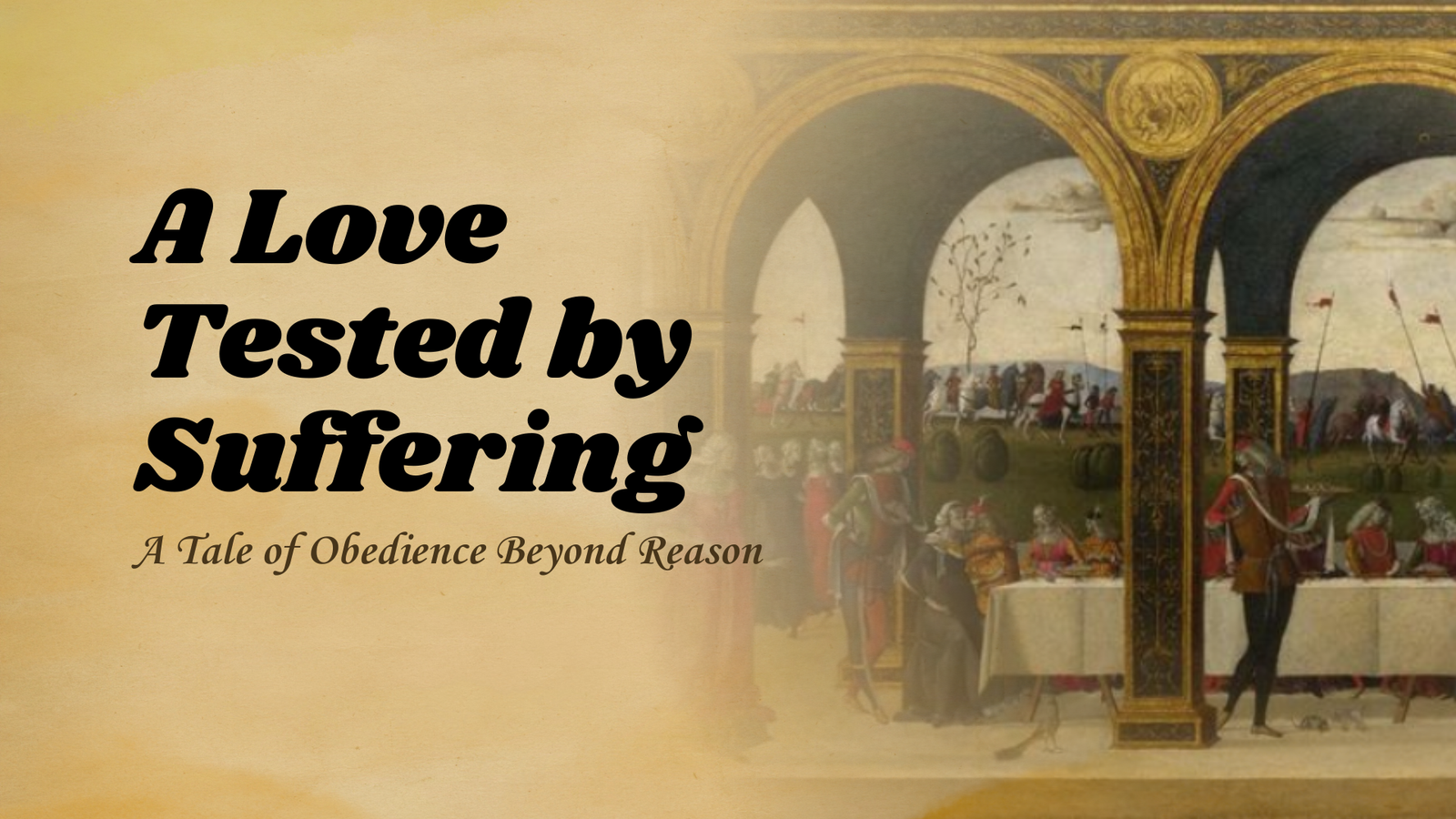"A Love Tested by Suffering: A Tale of Obedience Beyond Reason"

Introduction:
In the final tale of The Decameron, Giovanni Boccaccio tells the unsettling story of Griselda, which explores the fine line between devotion and oppression. This tale explores the brutal tests that Griselda endured. It is a story that showcases the harsh realities of power, gender and the cost of blind devotion. Her story exposes the expectations placed on women in medieval society. This tale remains relevant today prompting us to wonder, when does devotion become oppression, and who truly passes the test. The one who endures the suffering or the one who inflicts the pain?
Summary:
Griselda, a poor girl from a small village, attracted the attention of Gualtieri, a local nobleman. As an act of defiance, he chose to marry her. At first, the marriage seemed successful, with Griselda bearing both a daughter and a son. However, Gualtieri suddenly developed a desire to test his wife's loyalty. He began by criticizing and belittling her. As a second trial, he took away Griselda’s children, telling her they were dead, and sent her back to her poor village. For the final trial, Gualtieri announced that he would marry a new, younger bride, ordering Griselda to make the wedding arrangements. Instead of defying him, Griselda wished the bride and Gualtieri happiness, asking only that he not inflict the same wounds on his second wife. Moved by her unwavering obedience, Gualtieri revealed that the tests were over.
Analysis:
In The Decameron, Boccaccio crafts a haunting tale of power and submission through the story of Griselda. The story centered on Griselda’s absolute obedience which can be both admirable and horrifying. Her obedience and resilience can be a great virtue prompting to be rewarded in the end, and that patience withstands all tests. On the other hand, it also tells the message that blind obedience can at times enable cruelty, allowing power without limits.
Griselda in the story embodies the expectations of women in the medieval society. Her unwavering patience, resilience, and obedience raises the question whether she represents the ideal devotion of a wife, or a tragic story of submission. While Gualtieri, exposes the dark side of patriarchal authority, relentlessly tormenting Griselda. His relentless "tests" of her loyalty reveal not wisdom but his need for control, driven by insecurity over their class difference and a need to dominate. Together, these characters create the dark story of power and gender.
Boccaccio employs irony to heighten the tale’s tension. Gualtieri’s claims of testing Griselda’s virtue mask his own shortcomings, while Griselda’s unwavering obedience—meant to demonstrate the ideal devotion of a wife—instead exposes the cruelty of such expectations.
Griselda’s story remains relevant today as a reflection on power dynamics in relationships, workplaces, and societal structures. Her unquestioning obedience and submission mirror modern discussions about coercive control, gaslighting, and emotional abuse—where victims are manipulated into submission as a test of loyalty. In a time when marginalized groups are often expected to endure hardship to prove their worth, this tale continues to resonate.
Personal Response:
This tale, to me, was an eye-opener to the realities of our society. I was left daunted by the inhumanity of a patriarchal system. Gualtieri’s tests can be considered abuse, yet he faced no consequences. Personally, I strongly disapproved of the trials he imposed on Griselda. The idea of testing someone’s loyalty—and the fact that a husband could wield complete power over his wife—does not sit well with me. It felt as though love and duty were weaponized to justify control. The tale left me questioning whether there was ever genuine love between them. After all, who could be heartless enough to torture and inflict pain on someone they claim to love? Will we continue to romanticize suffering, or will we dismantle the power structures that demand it?
Conclusion:
The tale of Griselda is a haunting story that transcends the passage of time. Today, Griselda’s suffering echoes the struggles of those who are pressured to endure abuse, may it be in toxic relationships, workplaces, or injustices. This tale challenges us to recognize the difference between true resilience and forced submission. In an era that still glorifies unsustainable resilience, her story serves as a warning to stand our guard, and to refuse complicity in cruelty.







